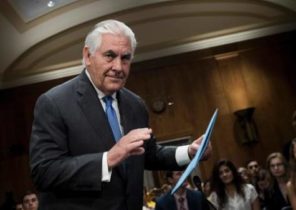Us-Saudi Alliance, dubbed the “Catholic marriage” for more than 75 years, but currently he is going through a particularly difficult time, members of Congress accused the Kingdom to participate in the economic war against the United States.
In March this year, Saudi Arabia decided to increase oil production to 13 million barrels, which led to the collapse of prices on the background of the General economic paralysis caused by the pandemic coronavirus. The consumption of oil decreased significantly, and the market formed the surplus of this product.
The current fall in oil prices was a heavy blow to the oil sector in the United States in its history as hundreds of companies now are unable to produce oil — the cost of production of American oil is very high compared to the Saudi alternative.
Thus, millions of jobs, which is so proud of the US President Donald trump, began to disappear at an unprecedented rate, while the media reported about the plans of hundreds of companies operating in the oil sector, to declare collective bankruptcy.
Americans consider Saudi Arabia responsible for the collapse in oil prices, because it occurred after Riyadh flooded the market with millions of barrels of oil, despite the decline in demand due to the pandemic.
On 17 April, the Wall Street Journal reported that the U.S. needs to deliver 50 million barrels of Saudi oil, which will have a strong pressure on the local market.
“The Saudis and the Russians are waging a war against American energy companies,” said CEO and founder of Hayman Capital Management Kyle bass.
He added: “the oil Tanks filled. We have a record oversupply of oil in the history, and the Saudis give us oil bomb in the form of 50 million barrels. How much it will lower oil prices in June?”
“My message to the Saudis: expand your tankers to go to hell,” wrote U.S. Senator Ted Cruz in his Twitter account on April 22.
According to Cruz, the number of Saudi oil flowing to America, seven times higher than the amount of oil arriving there every month, and as a result, millions of jobs in the United States are under threat.
Therefore, the us administration is considering the possibility of preventing the supply of Saudi oil to the United States or the imposition of additional duties, that is a lot of pressure on the energy sector in Saudi Arabia.
Congress unites against Saudi Arabia
Last month a number of leading allies of the Kingdom in the Congress informed the Ambassador of Saudi Arabia in Washington, Rome Bint Bandar that relations between the two countries will change and they will take stern action against Riyadh for flooding the market with oil.
According to Ted Cruz, the Ambassador defended his country, blaming it all on Russia, to which she replied that Russia is no friend of the USA, while Saudi Arabia is. He said, “You don’t act like our friends, as they try to destroy thousands of small businesses in Texas and across the country.”
A large part of the US oil industry is concentrated in the States of Texas, North Dakota and Louisiana, which are represented by Republicans, including Ted Cruz, one of the leading allies of the trump.
Saudi relations with the Republican party, which dominates in the Senate, now critically strained due to the so-called economic war the Saudis with America.
As for her relationship with the Democratic party having a majority in the House of representatives, they also are experiencing hard times because of the murder of a Saudi journalist Jamal Khashoggi and rapprochement crown Prince Mohammed bin Salman with trump.
Democrats have repeatedly tried to punish Saudi Arabia for violations of human rights and the continuation of the war in Yemen, but these attempts have always met with opposition from the Republican party, historically known for their support of the Kingdom.
April 23, Republican Senator from North Dakota, Kevin Cramer said: “I find it difficult to explain to voters why we spend our money and risk their lives to protect Saudi Arabia, which treats us now. To protect the Saudis have become extremely difficult.”
Us-Saudi Alliance will collapse?
As suggested by many American experts, the historic Alliance formed by former U.S. President Franklin Roosevelt and a founder of the Saudi state, king Abdul-Aziz al Saud in 1945, is on the verge of collapse.
According to the American magazine Foreign Policy, the Foundation of this Union was supplying oil to US in exchange for guarantees of Riyadh in the field of security.
Currently, this formula does not work, since Washington does not depend, as in the past, from Saudi oil. On the contrary, he wants to get rid of it or to impose duties and thereby protect their own companies and therefore it is not necessary to incur obligations and to ensure the Kingdom’s safety.
“The only thing that connects Saudi Arabia with the United States, is a trump,” said analyst Bruce Riedel, who worked in CIA for 30 years.
According to the newspaper, trump may leave the White house at the end of this year if the presidential election scheduled for November, will win the democratic candidate Joe Biden.
Is it possible to overcome the current crisis?
In the past, Saudi Arabia has used its oil weapon against the United States. This has occurred, particularly in 1973 when the late king Faisal bin Abdul-Aziz imposed a ban on oil exports in solidarity with Egypt in the war for the liberation of Sinai from Israel.
At that time Henry Kissinger, who was national security adviser in the White house considered the possibility of the outbreak of hostilities against Saudi Arabia, but in the end the country was able to resolve the conflict, as Washington needed Saudi oil.
According to Foreign Policy magazine, the crisis has created in the minds of Americans the idea that Saudi Arabia is not a reliable partner.
In 1979 the Islamic revolution overthrew the Shah of Iran Reza Pahlavi, and Iran turned into an enemy of the United States and Saudi Arabia decided to bet on the strengthening of strategic relations with the Americans as a partner in the fight against the Iranians.
At that time, President Jimmy Carter announced that the issue of security of oil supplies in the Persian Gulf and, in particular, supplies of Saudi Arabia is the center of attention of foreign policy in the region.
The destruction of the oil industry of Iran as a result of us sanctions gave Saudi Arabia more weight on the world oil market.
September 11, 2001, after the terrorist attacks in the United States, which were attended by Saudi citizens, the public in the United States mobilized against the Kingdom, which is clearly not liked the last one.
The consequences of this crisis are felt to this day, after the Congress unanimously passed a law allowing you to sue the Saudi authorities with the requirement about compensation for the families of the victims of the September 11 attacks.
When began the Arab revolutions, the position of the American administration at the overthrow of former President Hosni Mubarak have caused deep discontent in Saudi Arabia.
Moreover, the United States welcomed the coming to power of Mohamed Morsi, member of the organization “Muslim brotherhood” (banned in Russia — approx. ed.), which Saudi Arabia regards as terrorist.
When all known events have occurred in Syria, the Obama administration called for an end to violence and the resignation of President Bashar al-Assad, but the Kingdom is not given any dividends in the Syrian conflict, which according to Foreign Policy, the Saudis are considered the main threat to its security.
At the same time, the last one was extremely dissatisfied with the us administration’s decision to approve the appointment of Nouri al-Maliki, one of the allies of Iran, to head the Iraqi government.
The Saudis felt even more frustrated when the Obama administration signed a nuclear agreement with Iran that allowed Tehran to access frozen assets in American banks worth billions of dollars. According to Saudi Arabia, the money would be used for the implementation of subversive activities in the region.
Foreign Policy quoted a former U.S. official from the Obama administration, according to which, the concern of Saudi Arabia is not associated with the Iranian nuclear deal. In fact, she wanted Americans to put pressure on Tehran, that has adjusted its policy in Iraq, Syria and Yemen, but Washington did not.
After assuming the office of President of the United States in 2017, Donald trump has promised to stick to tough policies against Iran to cancel the nuclear deal and impose harsher sanctions.
With the coming to power of crown Prince Mohammed bin Salman of Saudi Arabia has started to build a strong relationship with the administration of trump, in particular, through the President-in-law Jared Kushner.
However, when in the summer of 2019, the Iranians attacked oil tankers in the Persian Gulf, trump said that Japan and South Korea themselves were defending their ships.
In the autumn of the same year, was attacked key oil installations in Saudi Arabia, which reportedly has made Iran, jeopardize nearly 5% of world oil production. Response of the United States was the fact that trump has published a tweet condemning the attack, and then demanded that Saudi Arabia paid to Washington in exchange for protection of its security.
In the end, the experts believe that us-Saudi relations, as always, will overcome the current difficulties, since Washington needs a big, rich and hostile to Iran, a country that serves the US interests in the middle East.
In this context, Bilal Saab, an expert of the Middle East Institute and a former adviser on middle Eastern Affairs at the U.S. Department of defense said: “it is difficult to imagine a rupture of relations between the two countries.”
Meanwhile, riddle says: “this time the Saudis we don’t need. The current crisis takes place in a completely different geopolitical environment than in previous conflicts.”






